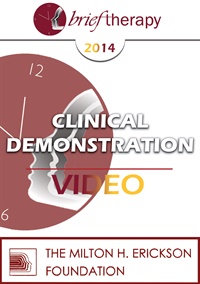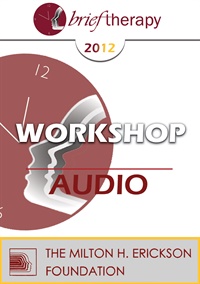
- Average Rating:
- Not yet rated
- Topic Areas:
- Neuroscience | Psychotherapy | Workshops
- Categories:
- Brief Therapy Conference | Brief Therapy Conference 2012
- Faculty:
- Ernest Rossi, PhD
- Duration:
- 2:42:36
- Format:
- Audio Only
- Original Program Date:
- Dec 06, 2012
- Short Description:
- BT12 Workshop 02 – Practicing the New Neuroscience of Psychotherapy – Ernest Rossi, PhD Group and individual demonstrations of Rossi’s new Activity-Dependent Approaches to the 4-stage creative process for optimizing of gene expression, brain plasticity, problem solving and mind-body healing. Practical approaches for all the psychotherapies as presented in Rossi’s 2012 book, Creating Consciousness: How Therapists can Facilitate Wonder, Wisdom, Beauty, and Truth.
- Price:
- $15.00 - Base Price
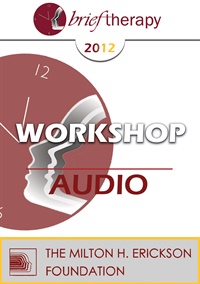
- Average Rating:
- Not yet rated
- Topic Areas:
- Psychotherapy | Workshops
- Categories:
- Brief Therapy Conference | Brief Therapy Conference 2012
- Faculty:
- Stephen Gilligan, PhD
- Duration:
- 2:46:21
- Format:
- Audio Only
- Original Program Date:
- Dec 06, 2012
- Short Description:
- BT12 Workshop 07 – Three Positive Connections Needed for Therapy Transformation – Stephen Gilligan, PhD Psychotherapy is an exploration of how individuals can forge positive, therapeutic responses to life challenges. This workshop focuses on the three core connections that allow clients to do this: (1) Positive intention and goals (“towards a positive future”); (2) Somatic Centering (“embodied presence”); and (3) Field Resources (“positive connections beyond the problem”). We will see how in a repetitive problem, all three of these connections are typically absent. More importantly, we will see how clients may be helped to developed and sustain these positive connections while engaging with challenging material—e.g., a past trauma, a present difficulty, or a future possibility. Participants will be offered multiple techniques and examples, as well as several demonstrations to illustrate this positive orientation to psychotherapy.
- Price:
- $15.00 - Base Price
Tags: Somatic Experiences
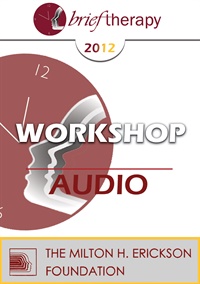
- Average Rating:
- Not yet rated
- Topic Areas:
- Family Therapy | Psychotherapy | Workshops
- Categories:
- Brief Therapy Conference | Brief Therapy Conference 2012
- Faculty:
- Camillo Loriedo, MD, PhD
- Duration:
- 2:49:55
- Format:
- Audio Only
- Original Program Date:
- Dec 06, 2012
- Short Description:
- BT12 Workshop 10 – Brief Family Therapy – Camillo Loriedo, MD, PhD The therapeutic relationship appears to be the key element for short-term treatment. The use of rapport in Ericksonian Psychotherapy is an excellent example of the essential use of the therapeutic relationship in Brief Family Therapy. As demonstrated by Carl Whitaker’s position in family therapy, therapist’s emotions, fantasies, and isomorphic behaviors can provide useful suggestions both for diagnosing and effectively utilizing the therapeutic relationship.
- Price:
- $15.00 - Base Price
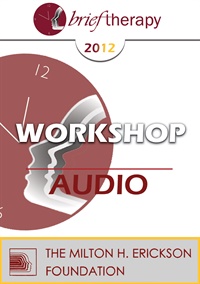
- Average Rating:
- Not yet rated
- Topic Areas:
- Psychotherapy | Workshops | Single-Session | Brief Therapy | Therapist Development
- Categories:
- Brief Therapy Conference | Brief Therapy Conference 2012
- Faculty:
- Michael Hoyt, PhD
- Duration:
- 2:51:05
- Format:
- Audio Only
- Original Program Date:
- Dec 06, 2012
- Short Description:
- Many therapies involve brief lengths of treatment, including a single session. A structure will be presented for organizing the tasks and skills involved in different phases (pre, early, middle, late, and follow-through) of therapy. Numerous case examples, including video, will illustrate brief therapy techniques useful both in initial sessions and in the course of longer treatments.
- Price:
- $15.00 - Base Price
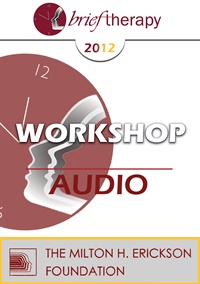
- Average Rating:
- Not yet rated
- Topic Areas:
- Consciousness | Neuroscience | Psychotherapy | Workshops | Four-Stage Creative Process | Self-Care | Therapist Development
- Categories:
- Brief Therapy Conference | Brief Therapy Conference 2012
- Faculty:
- Ernest Rossi, PhD
- Duration:
- 2:43:56
- Format:
- Audio Only
- Original Program Date:
- Dec 08, 2012
- Short Description:
- Neuroscience documents how experiences of (1) Novelty, (2) Environmental Enrichment, and (3) Mental & Physical Exercise can optimize gene expression, brain plasticity (brain growth), and mind-body healing. We will practice psychotherapy as discussed in my recent book Creating Consciousness: How Therapists can Facilitate Wonder, Wisdom, Beauty, and Truth.
- Price:
- $15.00 - Base Price
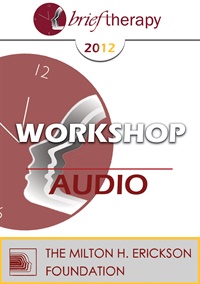
- Average Rating:
- Not yet rated
- Topic Areas:
- Psychotherapy | Workshops | Generative Psychotherapy
- Categories:
- Brief Therapy Conference | Brief Therapy Conference 2012
- Faculty:
- Stephen Gilligan, PhD
- Duration:
- 2:49:06
- Format:
- Audio Only
- Original Program Date:
- Dec 08, 2012
- Short Description:
- BT12 Workshop 36 – Transforming Negative States: A Workshop in Generative Psychotherapy – Stephen Gilligan, PhD This workshop presents the Ericksonian and Self-Relations Psychotherapy approach to human states of suffering: depression, anxiety, trauma, addiction, etc. This practical and positive approach assumes that each core human experience has equivalent potential to be positive or negative, depending on the human relationship to it; and thus focuses on how problems may be transformed to resources by skillful human connection. Multiple techniques and examples for will be given, along with an exercise and demonstration.
- Price:
- $15.00 - Base Price

- Average Rating:
- Not yet rated
- Topic Areas:
- Psychotherapy | Workshops | Brief Therapy | Life Focus Community
- Categories:
- Brief Therapy Conference | Brief Therapy Conference 2012
- Faculty:
- Erving Polster, PhD
- Duration:
- 1:45:46
- Format:
- Audio Only
- Original Program Date:
- Dec 08, 2012
- Short Description:
- The purpose is to transpose office therapy into communal application. Personal change is fundamental to psychotherapy but life focus is its instrumentality, often overshadowed. These groups will prioritize it, seeking to portray life. The groups may be large and life-long. Dr Polster will provide conceptual innovations, representative exercises and live communal illustration.
- Price:
- $15.00 - Base Price
- Average Rating:
- Not yet rated
- Topic Areas:
- Clinical Demonstrations | Psychotherapy | Generative Psychotherapy | Art and Creativity | Brief Therapy | Trance
- Categories:
- Brief Therapy Conference | Brief Therapy Conference 2014
- Faculty:
- Stephen Gilligan, PhD
- Course Levels:
- Master Degree or Higher in Health-Related Field
- Duration:
- 59:41
- Format:
- Audio and Video
- Original Program Date:
- Dec 13, 2014
- Short Description:
- This demonstration will show how problems/symptoms may be viewed as attempts by the creative unconscious to bring transformation and healing, and how the development of a generative trance can allow that transformation to be realized.
- Price:
-
Sale is $29.00
price reduced from Base Price - $59.00
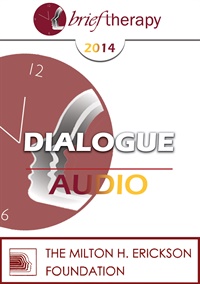
- Average Rating:
- Not yet rated
- Topic Areas:
- Dialogues | Experiential Therapy | Brief Therapy | Psychotherapy
- Categories:
- Brief Therapy Conference | Brief Therapy Conference 2014
- Faculty:
- Jeffrey Zeig, PhD | Steve Andreas, MA, NLP
- Duration:
- 1:00:36
- Format:
- Audio Only
- Original Program Date:
- Dec 13, 2014
- Short Description:
- Educational Objectives: Given a topic, describe the differing approaches to psychotherapy, and identify the strengths and weaknesses of each approach.
- Price:
- $15.00 - Base Price
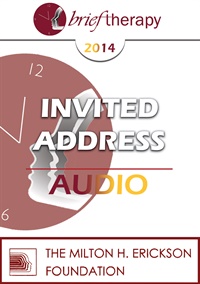
- Average Rating:
- Not yet rated
- Topic Areas:
- Invited Addresses | Brief Therapy | Generative Psychotherapy | Psychotherapy
- Categories:
- Brief Therapy Conference | Brief Therapy Conference 2014
- Faculty:
- Stephen Gilligan, PhD
- Duration:
- 1:02:32
- Format:
- Audio Only
- Original Program Date:
- Dec 14, 2014
- Short Description:
- Generative psychotherapy is an exploration of how individuals can forge positive, therapeutic responses to life challenges. This invited address concentrates on the three core connections that allow clients to do this: (1) Positive intention and goals (What do you most want to create in your life?); (2) Somatic Centering (Where do you feel the deepest resonance in your body?); and (3) Field Resources (What can most deeply support your path of change?).
- Price:
- $15.00 - Base Price
Please wait ...


